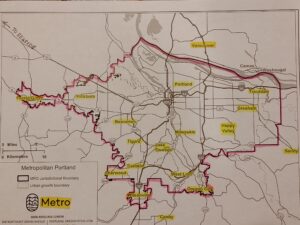
 I occasionally ask people if they’re aware of a layer of government that has far reaching authority over our local region, stretching from north Portland to Wilsonville, and Forest Grove to Troutdale? Most are surprised to discover I’m referring to METRO, the only regional government of its kind.
I occasionally ask people if they’re aware of a layer of government that has far reaching authority over our local region, stretching from north Portland to Wilsonville, and Forest Grove to Troutdale? Most are surprised to discover I’m referring to METRO, the only regional government of its kind.
When people hear of METRO, many visualize recycling, parks, and open spaces. Some think it’s the name of the light rail system. Few are aware that METRO’s biggest mission is coordinating and controlling transportation and land use planning in the metropolitan region. METRO has the final say over how our communities are planned, and how billions of transportation dollars are spent. METRO’s growth policies dramatically affect the quality of our neighborhoods, and the cost to live in them. As the authority over the UGB, (Urban Growth Boundary) METRO controls the region’s land supply. The Council’s official position is the UGB has no impact on the cost of housing. That’s certainly debatable.
Although there are 7 Councilors, each representing a district, they mirror each other. With the exception of Chair Petersen, most are political or social activists. Being an activist or social warrior is a fine attribute, but the non-partisan Councilor position requires extensive planning knowledge and a dedication to budget and fiscal analysis. As one who’s asked unanswered questions, I believe the Council rarely engages in deep discussion of the financial impacts of its decisions. They tend to act as facilitators while unanimously approving every proposal in front of them. There’s never a dissenting vote.
In spite of the pandemic and economic woes, people are moving to Clackamas, Multnomah and Washington Counties. We face inevitable population growth, and it must be regionally addressed by METRO. Does that mean our existing neighborhoods should be subject to offensive infill? We expect to live in denser neighborhoods, but where is the evidence that redeveloping or creating new neighborhoods is best done at the density levels promoted by METRO?
Recently METRO’s $5.5 billion transportation measure was soundly rejected by the voters. It was submitted years after local communities requested an investment in traffic congestion relief. As congestion grew, METRO repeatedly delayed placing a measure on the ballot; eventually turning a $1.9 billion concept into an unaffordable $5.5 billion wage tax, primarily dedicated to more transit. The ill-advised measure was this year’s centerpiece for Chair Lynn Peterson and the METRO Council. They promoted it as “a bold reimagining of our future”. It was an overpriced dud.
Where is there evidence that METRO is succeeding, or in touch with the current paradigm? Isn’t it time to revisit METRO’s mission, transportation policies, and some aspects of its Regional Framework Plan? METRO’s history of costly fiascos includes miscalculations of the amount of industrial land we need, the CRC, and planning disasters in Beavercreek, Stafford, Damascus and Hillsboro. The painful disincorporation of Damascus was set in motion by METRO’s misguided aspirations.
The pattern of costly failures has been overlooked because the public perceives METRO as a provider of parks, open spaces, recycling, and planning grants. Those are the things METRO does well. METRO is the face of a grand experiment. It’s being promoted as a template for master planning nationwide. Many political careers have been made by those who embrace METRO’s vision. There seems to be a feeling that METRO is too big to fail, even though it’s failing.
In the movie “Silver Streak” Gene Wilder finds himself on a runaway train that crashes into a station in the dramatic conclusion. There’s a growing feeling in the region that METRO is a runaway train, and our local communities are the passengers.
The results of the November election sent a message that the voters expect METRO to be more cautious, and less inclined to impose a “one size fits all” approach to the region. Years of failed methodology, bloated visions, and a lack of financial awareness were all exposed in the election. It’s time for METRO to revisit its Master Framework Plan, and relax some of its control over our communities. That won’t happen until more residents start asking questions and expecting answers. Let the conversation begin.
Les Poole
Clackamas County
Link to ORS.268 https://www.oregonlegislature.gov/bills_laws/ors/ors268.html
No Comments
Leave a comment Cancel